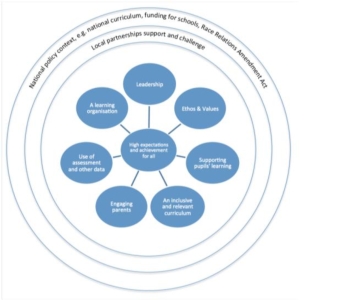Attainment in Bristol is rising: some groups perform above average, but some are at particular risk of underachieving.
Groups with attainment lower than Bristol and national averages include Somali, White Eastern European, and Pakistani learners. These groups’ attainment is improving faster than many others, so the gap is closing. White/Black and Black Caribbean, and Gypsy /Roma and Traveller learners’ attainment is also lower than average, but the gap is not closing for these groups. White British learners who are eligible for free school meals are also at risk of underachieving.
Socio-economic disadvantage, pupil mobility between schools and countries, pupil and parent aspirations, teacher expectations, and school/family engagement, can all affect attainment.
Barriers to achievement arise from interactions between home, community and school contexts. These factors apply to all learners from Black and Minority Ethnic (BME) and White British backgrounds.
Areas of successful practice include: leadership; ethos and values; supporting pupils’ learning; an inclusive and relevant curriculum; engagement with parents; use of assessment and other data; and working as a learning organisation.
These were evident in Bristol schools where BME learners succeed. There was a focus on high expectations and attainment for all: these areas are important for supporting the needs of all learners.
The research profiles attainment of Black and Minority Ethnic learners in Bristol and identifies successful practice used by local schools for raising the attainment of groups most at risk of underachieving. The research presents:
The most up to date evidence on attainment across the city, highlighting where progress has been made and where more needs to be done to narrow the gaps in attainment.
Evidence from Bristol and other parts of the UK about the challenges to achievement facing specific groups.
A model of successful practice, with examples from Bristol schools, of interventions that make a difference in raising expectations and outcomes for all.
The research took place between March and June 2012, and was funded by Bristol Education Attainment Partnership (BEAP) from Bristol City Council.
The team undertook a statistical analysis of performance data for different ethnic groups in Bristol schools and compared this to the national average to identify particular attainment issues for different groups. A review of research literature investigated evidence about factors that impact on attainment of different groups. Interviews with key personnel in the Local Authority and with community representatives developed a picture of the local challenges to achievement facing some groups of learners. The team then visited two early years, two primary and two secondary schools that have been successful in closing the attainment gap for these groups. Drawing on the experiences of Head teachers, classroom educators, teaching assistants, support staff, parents and learners the team identified the range of strategies that these schools use to make a difference and developed this into a model of successful practice.

A model of successful practice for closing the attainment gap in Bristol schools
The issues identified in the research are intended to stimulate dialogue between schools, local partners and the wider community. We hope it will act as an impetus and a reference point for sharing successful practice to tackle the attainment gap in schools.
Importantly, programmes that are effective for raising attainment of minority ethnic groups at risk of underachieving are also often effective for other ‘at risk’ groups including White British learners eligible for Free School Meals. The findings of this research, therefore, are of importance to all schools and can provide a framework for further developing practice to ensure that all schools and settings make a difference in closing gaps in achievement.
Professor Leon Tikly, Jo Rose, Emma Bent, John Hill
leon.tikly@bristol.ac.uk
Assessment and Evaluation; Mind and Brain in Social and Educational Contexts
